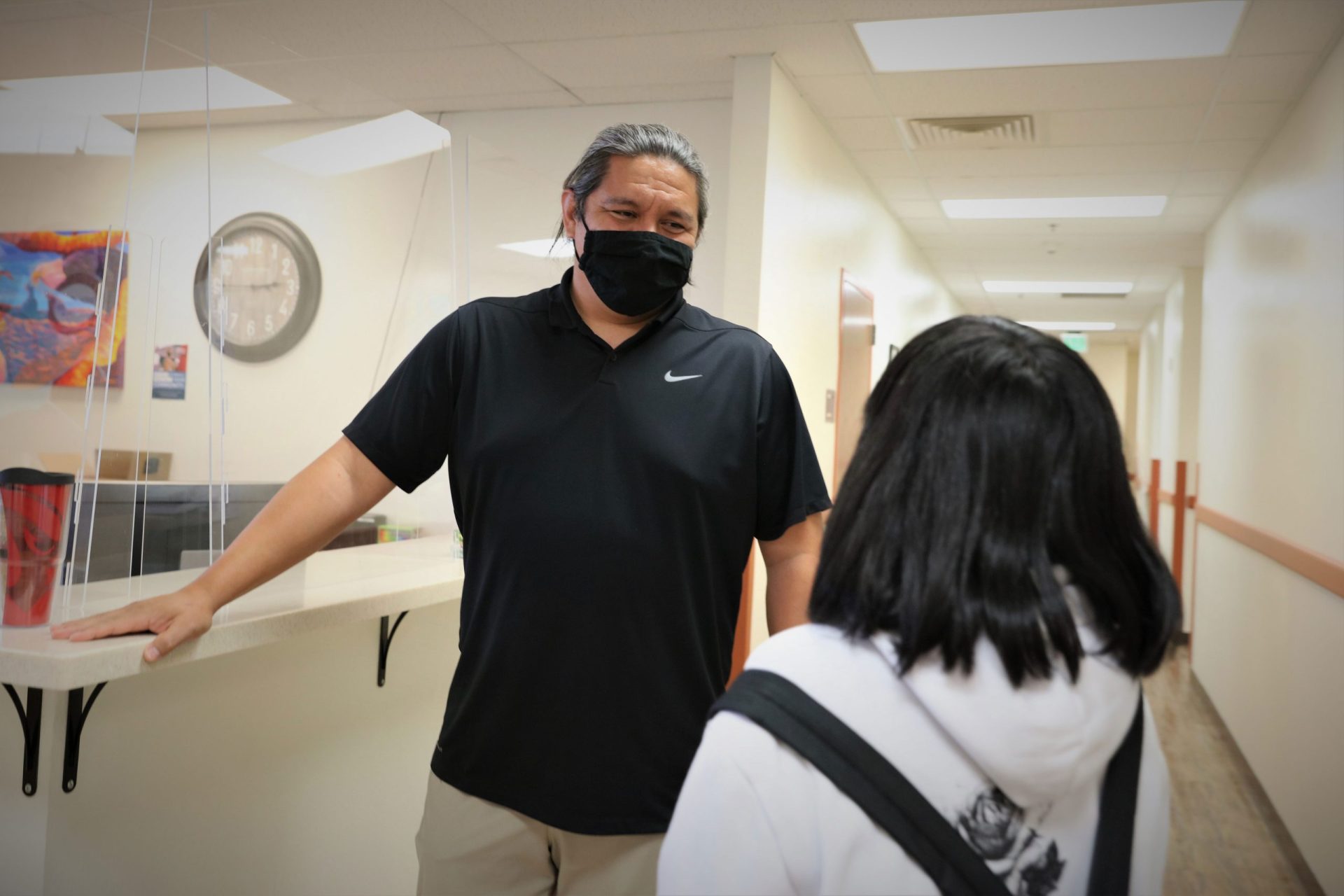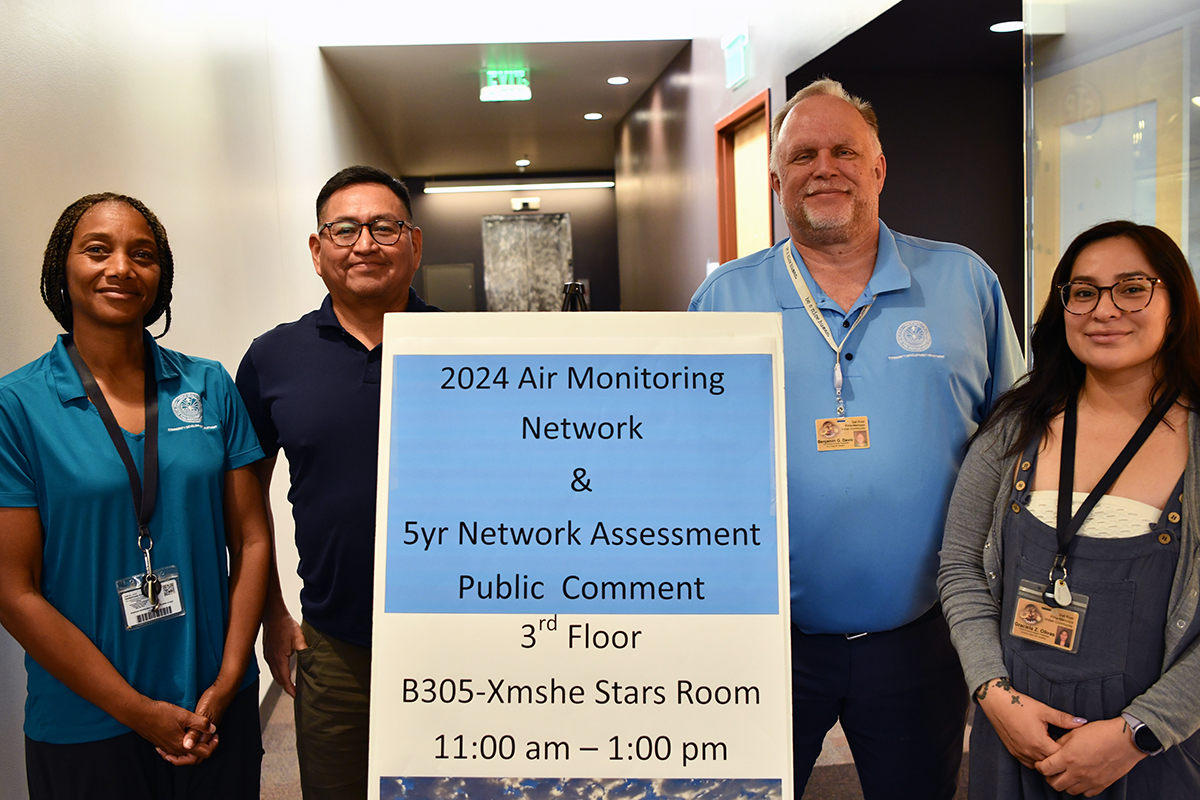VIEWS: 2190
November 24, 2021How the Pandemic Is Affecting Students and Families
As school carries on through the second year of the COVID-19 pandemic, parents, students and schools continue to deal with a variety of stressful situations that have taken a deep emotional toll on many families.
Salt River Pima-Maricopa Indian Community families have especially struggled as young children and teens juggle learning in different environments and the physical and emotional changes that come with growing up.
Salt River Schools provides stability and consistency that many students rely on as a source of support that contributes to their healthy development as young people.
“Native families are extremely resilient and tough people who we know have bounced back from many historical traumas,” said Education Social Services facilitator LeRoy C. Eswonia, M.S.
“This pandemic has been unique due to the physical, economic and social impacts that have increased the trauma, pressure and stress on each family unit. Many of the families we already support are facing stressors from a variety of angles, and the grief, loss and economic hardship caused by the pandemic served as another barrier to families moving towards balance and stability.”
Evan Duffy, M.D., a child and adolescent psychiatrist who works with the SRPMIC Health and Human Services Department, agrees with Eswonia, and says that young children are very resourceful and resilient. Duffy says children are adaptable to things like wearing face masks and getting immunizations; it’s when parent/guardian anxieties and concerns “trickle down” that children begin to reflect their elders’ fears.
“I have advised parents and guardians to discuss their own anxieties and fears with their children, so they can better understand concerns and efforts made to alleviate them. This in turn allows children to observe the caregivers in their life addressing issues and problems and methodically approaching solutions,” said Duffy.
Things can take a dramatic turn with older children and teens in particular, due to rapid growth, hormonal changes and a natural inclination to identify strongly with peers. This is magnified under the stress of a pandemic.
Duffy says that teenagers are more prone to “protest” school changes when they can’t be around peers the way they used to. This became evident in the last year and half, with school activities and even graduations being cancelled.
“It’s important with teenagers to recognize that part of the growing-up phases include ‘putting on’ different personalities and trying out different approaches to lifestyle, generally characterized by unusual clothing, haircuts, slang terms—all necessary parts of exploring their world,” said Duffy.
The experience of being a teenager is difficult enough as they go through new life experiences and experimental phases. The stress of a pandemic only compounds those experiences.
“Particularly popular now is declaring oneself non-binary, transgender, lesbian, gay, etc.,” said Duffy. “Though it’s surprising to many parents and guardians when they are being told this, it is important to remember that as people grow up, they do experiment with their environment to see what ‘fits’ them best. I remind families that teenagers change their minds a lot during experimental phases.”
Duffy has been particularly impressed that, more often than not, parents and guardians say they make sure their children know they are loved, no matter who they feel they are or what their personal identity.
“This is not necessarily a COVID-19–driven manifestation, but it has certainly been more noticeable in my practice and the practices of other pediatric psychiatrists I’ve spoken with over the past two years,” said Duffy.
When some parents or guardians have come in to talk to Duffy, they have discussed struggles children and teens had with learning that is completely online, which was quite common last year. According to Duffy, while some children actually do well with computer-based learning, it is only a small percentage.
“Loss of socialization with peers was a big contributor to poor school success; children could not focus and concentrate as well. Frequently I was being made aware of children just leaving their home ‘work site’ and wandering away, or instead just doing video games or watching YouTube and TikTok,” said Duffy.
“Some families tried to remedy this with decreasing [time on] electronic devices or using that as an incentive once school work was completed. So far this year, with schools opened up, these issues are on the decline.”
“I think the most important tip for navigation for families and children [in regards to struggles during the pandemic] is to ask for support when needed,” said Eswonia. “Even those of us who are professional helpers were reminded during the pandemic that we all need support at times and there is absolutely nothing wrong with reaching out to a friend, a family member or professional for support.”
Families seeking resources for education, basic needs, health or behavioral health can contact Education Social Services at (480) 362-2573.
10 Tips for Families of Students During the Pandemic
From www.emersonhospital.org
1. Flexibility is key. Talk with your children about the importance of staying flexible. Protocols that may be in place in September may change as the school year goes on. With a flexible attitude, children and parents can build resiliency that will help pave the way for a smooth year.
2. Have conversations. Candid, age-appropriate conversations with your children will help them know they are not alone. Although we do not have all the answers, scientists, health experts, parents, teachers and other leaders are working hard to ensure students’ health and safety.
3. Get back to a regular sleep schedule. Many students are on a different sleep schedule throughout the summer. Parents can start incrementally pushing up bedtime in August to help ease the transition. Try to follow a consistent bedtime routine and avoid electronics in the bedroom.
4. Prevent separation anxiety. Children may feel nervous about going back to school and being apart from family members. Have conversations about school and develop tools for your child to feel connected to home, such as notes in their lunchbox or a family photo they can bring to school.
5. Have a plan. Family routines changed during the pandemic. Parents who worked from home may now need to go to the workplace. One of the best ways to help a child feel supported is to ensure they know where all family members are and how to reach them if needed. Consider placing a whiteboard in the kitchen noting where each family member is each day.
6. Communicate with your child’s teacher. Let your child’s teacher and guidance counselor know if something is going on that might affect the student, such as the loss of a parent’s job, a death in the family, a divorce or other significant life change. Teachers do best when they know what is going on in their students’ lives that could impact their ability to focus, socialize and come to school ready to learn.
7. Make time to listen. Your children may react to changes in their routine in various ways. Be ready for some behavior changes, such as acting out in younger children and quietness in teens. Before bed is a good time to listen to your child recount events and feelings from the day. This extra time provides a safe environment for children to express their emotions, and you may be surprised how much you learn about them.
8. Watch for signs of stress. Stay tuned to warning signs that your child, grandchild or someone you love might need mental health support. These signs include:
- Sudden changes in activities or behaviors
- Sudden weight loss or weight gain
- Trouble in school or extracurricular activities, including missing homework or ending participation
- Reckless behavior, such as withdrawing or acting rebellious, aggressive or overly impulsive
- Signs of depression, such as excessive isolation
- Substance use or abuse
- Sleeping too much or too little
- Destructive behaviors such as self-injury
- Talking or writing about suicide and death
9. Do not delay your child’s healthcare. Many health issues can be easily managed when recognized early but can lead to challenges if caught later. Your pediatrician will keep your child up to date on immunizations and routine screenings to aid their overall health.
10. Foster a positive digital environment. Digital media use can have positive and negative impacts on mental health. Encourage your family to disconnect on a regular basis.







